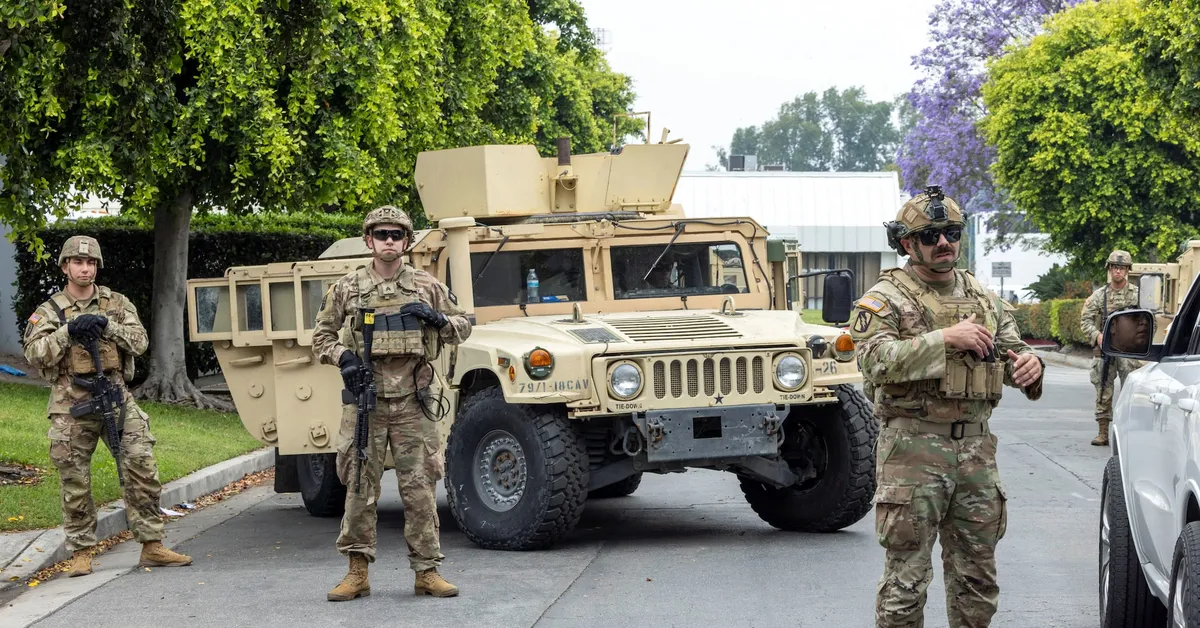
Los Angeles Trial Begins Over Trump's Deployment of National Guard for Deportation Efforts
On August 11, 2023, a pivotal trial commenced in Los Angeles, centering around the Trump administration's use of National Guard forces to bolster deportation initiatives and manage protests. This legal challenge questions the U.S. president's deviation from established norms regarding the deployment of military personnel on American streets. The three-day, non-jury trial is presided over by U.S. District Judge Charles Breyer, based in San Francisco.
The court's primary focus is to determine whether the government breached a 19th-century statute prohibiting military involvement in civil law enforcement when Trump dispatched troops in June. California's legal challenge asserts that this action was inappropriate and unlawful. Judge Breyer emphasized the need to ascertain if the military's involvement constituted an enforcement of domestic law, and if there remains a potential threat of future military deployments for similar purposes.
The backdrop of this trial includes recent unrest and protests in Los Angeles, ignited by mass immigration raids targeting gathering spots like Home Depot, garment factories, and warehouses. In response, the administration contends that the troops were not engaged in civil law enforcement but were instead tasked with protecting federal properties and U.S. Immigration and Customs Enforcement (ICE) agents.
Although many National Guard troops have been withdrawn, California's Attorney General Rob Bonta reported on August 11 that 300 members continue to participate in immigration raids and restrict civilian movement within the state. A recent court filing by California's Democratic Governor Gavin Newsom indicated that the activation of these troops has been extended through November 6.
Attorney General Bonta characterized the federal government's deployment of military forces in Los Angeles as a form of "political theater and public intimidation," asserting that such actions lack precedent in American history. California, along with Governor Newsom, has petitioned Judge Breyer to prevent the troops from engaging in domestic law enforcement activities, arguing that their involvement alongside ICE agents violates the Posse Comitatus Act of 1878 and other regulations prohibiting military participation in civilian law enforcement.
In June, President Trump ordered the deployment of 700 Marines and 4,000 National Guard troops to Los Angeles, defying Governor Newsom's objections. The lawsuit aims to reclaim control of California's National Guard and to declare Trump's actions illegal. However, the trial's outcome may have limited ramifications for Trump's plans to send National Guard troops to Washington, D.C. as part of a broader effort to tackle violent crime, despite the city recording a 30-year low in violent crime rates in 2024.
During the trial proceedings, Trump reiterated his commitment to restoring law, order, and public safety in Washington, stating that the National Guard would be allowed to perform their duties effectively. Unlike California, where governors typically hold authority over National Guard activations, the president has direct control over these forces in Washington. A ruling against the administration could impose restrictions on military actions in U.S. cities, including Los Angeles, Chicago, New York, and Baltimore, which Trump has also identified as potential areas for military involvement.
The decision to deploy troops in Los Angeles has sparked a national conversation about the military's role on U.S. soil, intensifying political tensions in the nation’s second-largest city. A U.S. appeals court has permitted Trump to maintain control over California's National Guard amid this legal challenge. The trial before Judge Breyer will play a critical role in shaping the future of military involvement in domestic law enforcement.